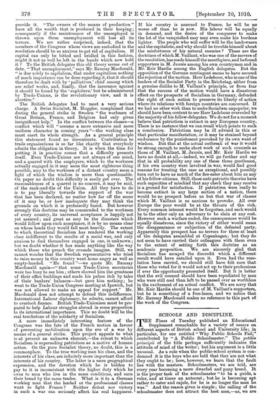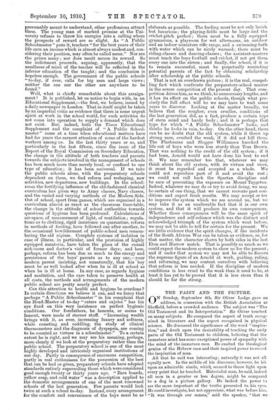SCHOOLS AND DISCIPLINE.
TIE Times of Tuesday published an Educational Supplement remarkable for a variety of essays on different aspects of British school and University life; in particular, for one entitled. " Why Public Schools Fail," contributed by " A Public Schoolmaster." The petitio principii of the title perhaps sufficiently indicates the attitude of mind of the writer ; but his argument is a little unusual. As a rule when the public-school system is con- demned it is the boys who are told that they are not what they ought to be ; here, however, we learn that the fault lies with the masters. Schoolmasters, we are told, are every year becoming a more dwarfed and puny breed. It is the proper task of the schoolmaster " to be a guide, a ruler, and at times an autocrat ; but he is becoming apt rather to cater and cajole, for he is no longer the man he was." And the reason given is simple ; the calling of the schoolmaster does not attract the best men,—as, we are presumably meant to understand, other professions attract them. The young man of marked promise at the Uni- versity refuses to throw his energies into a calling where the prospects of reward are so slight. As " A Public Schoolmaster" puts it, teachers "for the best years of their life earn an income which is almost always modest and, con- sidering their position, may often be called mean." Nor are the prizes many ; nor does merit secure its reward. So the indictment proceeds, arguing, apparently, that the smallness of mind of the teacher will be reflected in the inferior education of the taught ; and the conclusion is hopeless enough. The government of the public schools " to-day, if ever, calls for big men and large views ; neither the one nor the other are anywhere to be found."
Well, what is chiefly remarkable about this arraign- ment? It is published, let us notice to begin with, in an Educational Supplement, the first, we believe, issued by a daily newspaper in London. That in itself might be taken by an impartial critic as evidence that there is some urgent spirit at work in the school world, for such activities do not come into operation to supply a demand which does not exist. But, indeed, both the Times Educational Supplement and the complaint of " A Public School- master" come at a time when educational matters have had for years the earnest attention of some of the hardest workers among us. In the last thirty years or so, and particularly in the last fifteen, since the issue of the Report of the Royal Commission on Secondary Education, the change in the attitude of both teachers and parents towards the subjects involved in the management of schools has been much more than merely local, or confined to one type of education ; it has been universal. If we take the public schools alone, with the preparatory schools dependent on them, we find reform and reshaping, new activities, new departures, new buildings. In the school- room the fortifying influence of the old-fashioned classical curriculum has given way to Army classes, Navy classes, and the varied and varying methods of the Modern Side. Out of school, apart from games, which are organised in a curriculum almost as exact as the classroom time-table, the change in the attitude of school authorities towards questions of hygiene has been profound. Calculations of air-space, of measurement of light, of ventilation ; regula- tions as to clothing, rigid insistence on quarantine, reform in methods of feeding, have followed one after another, to the occasional bewilderment of public-school men remem- bering the old regime. Complete systems of isolation in case of illness, in particular, and the provision of highly equipped sanatoria, have taken the place of the casual sick-room and doctor's visit of former days ; and here, perhaps, reform has been due as much to the energy and persistence of the boys' parents as to any one,—your modern parent insisting, not unnaturally, that his boy must be as well looked after when he is ill at school as when he is ill at home. In any case, as regards hygiene and sanitation, and the care taken to preserve health at all costs, the methods and arrangements of the modern public school are pretty nearly perfect.
Can this attention to health and hygiene be overdone ? In certain directions we believe it can, and we fancy that perhaps " A Public Schoolmaster " in his complaint that the Head-Master of to-day "caters and cajoles" has his eye fixed on this very insistence on perfect hygienic conditions. Our forefathers, he laments, or seems to lament, were made of sterner stuff. " Increasing wealth brings with it, as ever, increasing luxury and softness, while cosseting and coddling, the study of clinical thermometers and the diagnosis of dyspepsia, are coming to be counted as virtues in a schoolmaster." To a certain extent he is right, and we may see his meaning, perhaps, more clearly if we look at the preparatory rather than the public school. The preparatory school is one of the most highly developed and intricately organised institutions of our day. Partly in consequence of enormous competition, partly in real enthusiasm for the possession of the best that can be had or given, preparatory schools have adopted standards entirely superseding those which were considered good enough twenty or thirty years ago. " Bare boards, yellow soap, and cold water" was a description applied to the domestic arrangements of one of the most renowned schools of the last generation. Few parents would look twice at such a school to-day. Instead, every arrangement for the comfort and convenience of the boys must be as elaborate as possible. The feeding must be not only lavish but luxurious ; the playing-fields must be large and the cricket-pitch perfect ; there must be a fully equipped gymnasium, a playroom for wet afternoons, an outdoor and an indoor miniature rifle range, and a swimming-bath with water which can be nicely warmed ; there must be riding-classes and dancing-classes ; the assistant-masters must teach the boys football and cricket, if not get them every one into the eleven ; and finally, the school, if it is to remain successful, must be perpetually reminding potential parents of the fact by obtaining scholarship after scholarship at the public schools.
That is not an overdrawn picture ; it is the real, compel- ling fact which confronts the preparatory-school master in the severe competition of the present day. That com- petition drives him, as we think, to unnecessary lengths, and it has its effect on the public schools, though what pre- cisely the full effect will be we may have to wait some years to discover. Looking at the matter broadly, we believe that the rougher, even crueller, conditions of the last generation did, as a fact, produce a certain type of stern mind and hardy body ; and it is perhaps that type for which " A Public Schoolmaster " looks, and thinks he looks in vain, to-day. On the other hand, there can be no doubt that the old system, while it threw up strong men, crushed the weak, if it did not kill them. The Flashmans and Slogger Williamses knocked the life out of boys who were less sturdy than Tom Brown. That was nothing to the credit of the old system ; if it had been, Arnold would not have done his best to end it. We may remember too that, whatever we may think about the old system, with its virtues and vices, it must be regarded and accepted as a whole. We could not reproduce part of it and avoid the rest ; we could not call back the Spartan discipline and be sure of preventing the exposure on Mount Taygetus. Indeed, whatever we may do or try to avoid doing, we may be certain of one thing, that we cannot recreate past con- ditions and expect fresh results. We may accept or try to improve the system which we see around us, but we may take it as an unalterable fact that it is our own system, and that it will produce its own consequences. Whether those consequences will be the same spirit of independence and self-reliance which was the distinct and acknowledged triumph of the system which went before, we may not be able to tell for certain for the present. We see little evidence that the spirit changes, if the incidents of the South African War can be taken as evidence, or, for that matter, the character shown by both sides in the last Eton and Harrow match. That is possibly as much as we could expect the modern system to show us for the present; and if under that system we may not be able to discern the supreme figure of an Arnold at work, guiding, ruling, and reforming, we may content ourselves with believing that reform is less needed. If the discipline of modern conditions is less cruel to the weak than it used to be, at least it has yet to be proved that it is less stern than it should be for the strong.







































 Previous page
Previous page